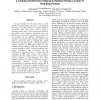Free Online Productivity Tools
i2Speak
i2Symbol
i2OCR
iTex2Img
iWeb2Print
iWeb2Shot
i2Type
iPdf2Split
iPdf2Merge
i2Bopomofo
i2Arabic
i2Style
i2Image
i2PDF
iLatex2Rtf
Sci2ools
125
click to vote
JDCTA
2010
2010
Learning and Decision Making in Human During a Game of Matching Pennies
To gain insights into the neural basis of such adaptive decision-making processes, we investigated the nature of learning process in humans playing a competitive game with binary choices, using a matching pennies game. As in reinforcement learning, the subject's choice during a competitive game was biased by its choice and reward history, as well as by the strategies of its opponent. Furthermore, we recorded event-related brain potentials (ERPs) while subjects played the game to evaluate how neural responses to outcomes related to subsequent decisionmaking. Analyses of ERP data focused on the feedback-related negativity (FRN), an outcome-locked potential thought to reflect a neural prediction error signal. Consistent with predictions of the reinforcement learning model, we found that the magnitude of ERPs after losing to the computer opponent predicted whether subjects would change decision behavior on the subsequent trial. These findings provide novel evidence that humans engage...
Competitive Game | Game | JDCTA 2010 | Reward History |
Related Content
| Added | 19 May 2011 |
| Updated | 19 May 2011 |
| Type | Journal |
| Year | 2010 |
| Where | JDCTA |
| Authors | Jianfeng Hu, Xiaofeng Li, Jinghai Yin |
Comments (0)

